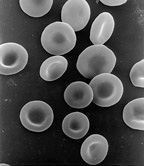
Photo from wikipedia
This study aims to investigate how metformin (Met) affects muscle tissue by evaluating the drug effects on proliferating, differentiating, and differentiated C2C12 cells. Moreover, we also investigated the role of… Click to show full abstract
This study aims to investigate how metformin (Met) affects muscle tissue by evaluating the drug effects on proliferating, differentiating, and differentiated C2C12 cells. Moreover, we also investigated the role of 5’-adenosine monophosphate-activated protein kinase (AMPK) in the mechanism of action of Met. C2C12 myoblasts were cultured in growth medium with or without Met (250μM, 1mM and 10mM) for different times. Cell proliferation was evaluated by MTT assay, while cell toxicity was assessed by Trypan Blue exclusion test and Lactate Dehydrogenase release. Fluorescence Activated Cell Sorting analysis was performed to study cell cycle. Differentiating myoblasts were incubated in differentiation medium (DM) with or without 10mM Met. For experiments on myotubes, C2C12 were induced to differentiate in DM, and then treated with Met at scalar concentrations and for different times. Western blotting was performed to evaluate the expression of proteins involved in myoblast differentiation, muscle function and metabolism. In differentiating C2C12, Met inhibited cell differentiation, arrested cell cycle progression in G2/M phase and reduced the expression of cyclin-dependent kinase inhibitor 1. These effects were accompanied by activation of AMPK and modulation of the myogenic regulatory factors. Comparable results were obtained in myotubes. The use of Compound C, a specific inhibitor of AMPK, counteracted the above-mentioned Met effects. We reported that Met inhibits C2C12 differentiation probably by blocking cell-cycle progression and preventing cells permanent exit from cell-cycle. Moreover, our study provides solid evidence that most of the effects of Met on myoblasts and myotubes are mediated by AMPK.
Journal Title: PLOS ONE
Year Published: 2023
Link to full text (if available)
Share on Social Media: Sign Up to like & get
recommendations!